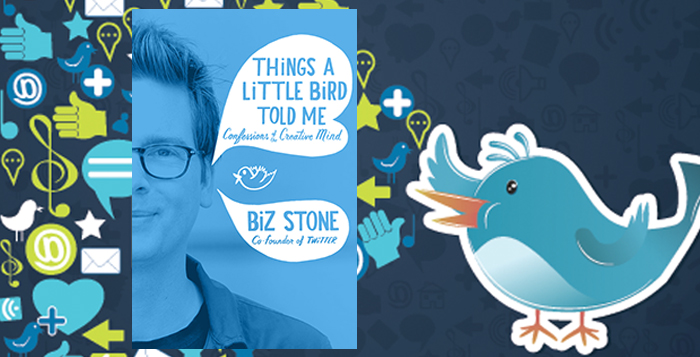Things a Little Bird Told Me will appeal to all business people who love what they do. Stone is a maverick. At age 40 he is worth $250m and has worked with some of the world’s smartest entrepreneurs. This book may not get you as much money – but it will inspire you.
In the UK this month to help launch bookstore Foyles’ new flagship outlet, Stone mingled with shoppers standing by a stack of his book. He asked them questions and listened to their stories of how Twitter had changed the world for the better. He lives the story he tells.
[pull_quote_right]Twitter co-founder Biz Stone is a maverick. At 40 he’s worth $250m. This book may not get you as much money – but it will inspire you[/pull_quote_right]
Stone’s wealth comes from collaborating with Evan Williams and Jack Dorsey. Williams founded Blogger and then Twitter (two of the world’s top 10 sites). At 35, Dorsey is on the Disney board. He also heads up Square, the mobile payments solution. They made Twitter. But Stone told them who it was for and how it could be used.
A side-project, Twitter kept on growing because users loved it. So did the founders. Selling Blogger to Google had made Williams wealthy. His partner Stone was still dirt poor.
One day he was ripping up the carpet in his tiny box of a house. It was a heatwave. He hoped to find hardwood underneath. It was concrete. Stone’s phone buzzed. It was a tweet from Williams saying: “Sipping pinot noir after a massage in Napa Valley”.
“My situation at precisely that moment, and its incongruence with Ev’s, made me laugh out loud. My wife thought I had lost my mind. In truth, I was not just amused: I was enlightened. In that moment I realised why my other startups had failed and why Twitter was going to work. Twitter brought me joy,” Stone writes.
“That hot day stands out because it was the day I realised the value of emotional investment. You know in your heart that something’s worth pursuing: you’re not sure exactly why, but it doesn’t matter.”
It is a great description of why entrepreneurs win. Stone offers more, such as a great list of rules about how customers should be treated that you can adapt. Or his story of watching Twitter users and realising that it could change the world.
And his views on charity: “It is hard to give money when you have very little. Believe me I spent many years in debt and I know intimately how it feels to worry about every single dollar. But people generally go about philanthropy the wrong way. They think you need to wait until you’re rich to give.
“Waiting to give is a mistake. It doesn’t have to be about money. If you get involved early – now – the value of your gift is compounded over time. This is true in two ways. First setting the habit of thinking of others early… Second your gifts have a ripple effect. Over the next two decades the amount of good you will have done will be exponentially greater than if you’d waited.”
If you love being in business, your customers, and giving, this book is for you. It will help you create value. How much is Twitter worth, Facebook’s Mark Zuckerberg asked. Stone made up an answer: $500million. Twitter floated last year for $30billion.





Comments
This article doesn't have any comments yet, be the first!